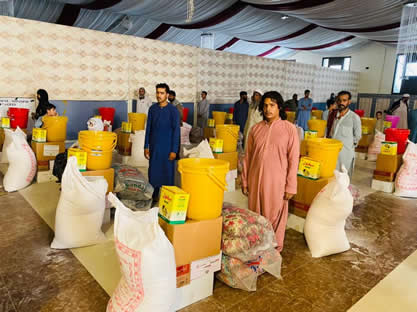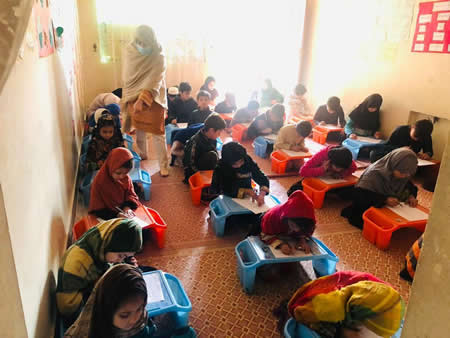Humanitarian Response to Most Vulnerable Afghan Refugees


SPADO rendered humanitarian support to the flood affected & newly returned Afghan Refugees in the urban cluster settlements of district Peshawar and flood hits areas in Nowshera in partnership with SOLIDAR. Through this intervention we strived for providing equitable, easy & free access to education services for the newly returned Afghan refugees that continue to reside in transitional refugee settlements. Our key strategy focused on developing and strengthening strategic partnerships with critical stakeholders and capitalize on innovative practices such as accelerated learning programmes to reach out-of-school children, especially girls.
Similarly, we also focused on supporting the identified/selected beneficiary groups by implementing activities necessary to improve the well-being of vulnerable women and children. These activities included mental health and psychosocial support [MHPS], protection of women and children from Gender Based Violence [GBV], abuse and exploitative behaviours, along with hygiene and primary healthcare.
Our project organized and capacitated Women Support Groups (WSGs). These women support groups included educated girls/women and Lady Health Workers (LHWs) from amongst the beneficiary community. These groups helped respective refugee communities, particularly at-risk women and children, in accessing protection, health and well-being services. Each WSG, comprised of 10 members with one chair and one vice chairperson. Linkages of the Women Support Groups were established with Commissioner Afghan Refugee office to act as a platform for resolution of protection specific issues. Similarly, we also run a detailed capacity building campaign for these Women Support Groups as well.
The Afghan Refugees were also supported with Food and Non-food Items including hygiene, dignity, kitchen-ware and winterization kits. These kits sufficiently catered for the nutrition & health hygiene needs of a family of 10 individuals for a period of 40 days as per our post-distribution monitoring exercise. A total of 3895 HHs have been facilitated in the project life time.

SPADO established 08 non-formal education centers in rented community buildings near or within the refugee settlements to provide a more plausible/accessible platform and access to basic education. The NFE centers were utilized for providing effective alternate education services and we are supported 432 children via these established centers. Our centers operated with the child-friendly spaces approach that involved fun-based learning activities. In these centers, we also provided nutritious diets to the children enrolled for safeguarding their physical and mental development. For these NFE Centre’s 14 Afghan Refugee girls were hired as NFE facilitators. They were formally trained with the technical support of JICA on teaching methodology and session delivery for the non-formal curriculum developed by JICA-Pakistan.

